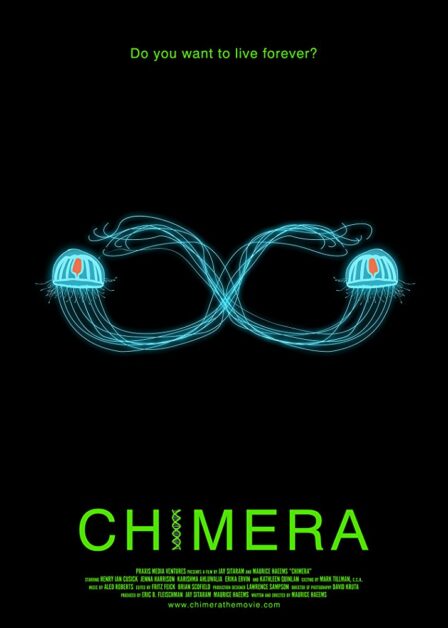Scientific research in fictional horror and horrific reality tends to come with a price one way or another. One concept both worlds often cross is the question of morality. How far can science push the ethical limits to achieve greatness before the ends no longer justify the means? This is the ultimate question Quint (Henry Ian Cusick, Lost, Hitman and The 100), an ingenious yet troubled scientist, struggles with throughout Maurice Haeems’ directorial debut Chimera.

With his children, Miles (Raviv Haeems) and Flora (Kaavya Jayaram), fighting a terminal illness and his wife Jessie (Karishma Ahluwalia) on life support, Quint races against time to find a cure for this inheritable disease. Doing everything he can with limited resources, Quint searches for alternative options but is ultimately in desperate need of stem cells to further his scientific progress towards a cure. With religious and political controversy surrounding anything involving embryotic stem cell research, Quint finds everywhere he turns is blocked by legal red tape. As a last resort, the distraught scientist looks to other means. However, this leads to only finding himself indebted to a dubious wealthy financier named Masterson (Kathleen Quinlan, Breakdown and The Hills Have Eyes) who has deep pockets and seemingly unlimited resources.

Sharing an interest in the outcome of Quint’s research, Masterson demands results, but also warns that his ongoing request for stem cells will require a horrible means to an end. Determined to get his coveted resources, Quint gives Masterson the go-ahead without inquiring the details while simultaneously ignoring claims from Charlie (Jenna Harrison), a colleague of science, that his scientific endeavor is futile.
Grasping for more time, Quint finds hope when he discovers a way to cryogenically freeze his two dying children with plans to revive when a cure is found. However, soon after implementing this procedure, his hope reverts back to panic when he uncovers Masterson’s method of procuring stem cells and she discovers his advancements in cryogenics. Quint soon finds himself in a deadly predicament that could cost him everything.

With an enticing mesh of science fiction and horror, Maurice Haeems boldly tackles a controversial subject through his layered debut feature. While vocalizing both opinionated sides of stem cell research, Chimera reflects the complexity of such scientific endeavors throughout the film as well as the title. Chimera, meaning an impossible achievement that is sought after through hope, appropriately mirrors a father’s determination against all odds, which is found at the story’s core.
Where Chimera seems to struggle is rooted in sequencing as well as an abundance of unnecessary and confusing scenes. Feeling as though you are dropped into the middle of a story’s climax, it is often unclear as to whether you’re seeing a flashback, what is presently happening and what is simply part of Quint’s guilt-ridden madness of distress. Portraying some scenes in black and white while adding text conveying time elapsed in other scenes could have helped alleviate confusion while maintaining a certain level of mystery and substance.
During the scenes where Chimera treads water, the film stays moving primarily by an outstanding cast. While the character backstory of Masterson could have used a more elaboration, Quinlan owns her role as a wealthy self-motivated conniving antagonist. Ahluwalia, Raviv Haeems and Jayaram are believably essential in striking at the heart of emotion as Quin’s wife and kids. Harrison is another phenomenal face to this film as her character is key to an incredible twist ending to this feature. However, Cusick serves as the perfect focal point conveying and emitting every Pandora’s box of emotion expected with seemingly minimal effort while applaudable avoidance of exaggeration.
At times, Chimera is riddled with a plethora of confusion. However, it dares to take on a controversial topic while featuring heartfelt driven moments by an outstanding cast. The phenomenal twist towards the end makes this feature worthwhile by capitalizing on all previously invoked emotions along with a sense of shock, sadness, and dismay. Maurice Haeems may not have stricken gold with his debut, but his heart is surely in the right place setting him on the right track for future filmmaking ventures.
 PopHorror Let's Get Scared
PopHorror Let's Get Scared




